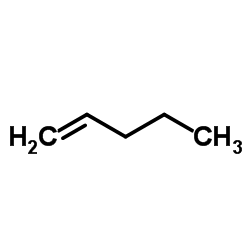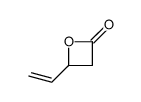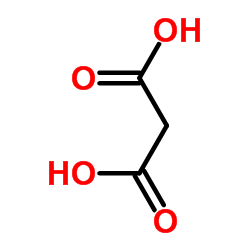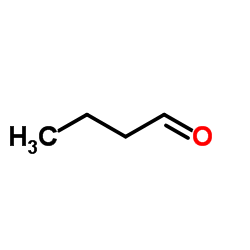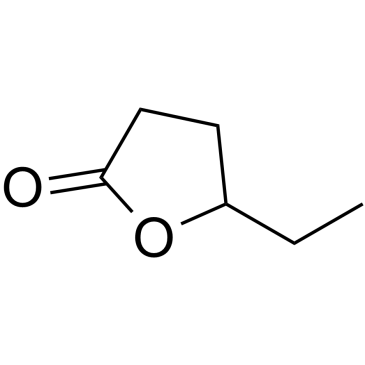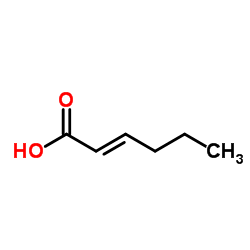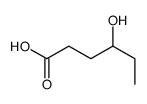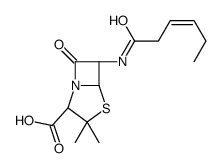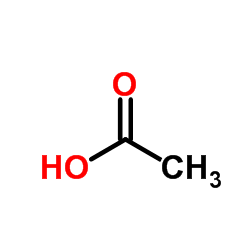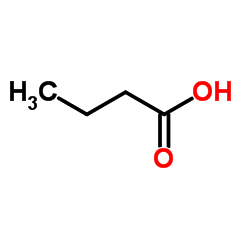4219-24-3
| 中文名 | 3-己烯酸 |
|---|---|
| 英文名 | 3-hexenoic acid |
| 英文别名 |
Hex-3-en-carbonsaeure
hex-3-enoic acid 1-[3]pyridyl-heptan-1-one EINECS 224-157-1 3-Hexenoic acid 3-heptanoylpyridine n-hexyl 3-pyridyl ketone Hex-3-ensaeure 1-(pyridin-3-yl)heptan-1-one 1-[3]Pyridyl-heptan-1-on |
| 密度 | 0.985g/cm3 |
|---|---|
| 沸点 | 209ºC at 760mmHg |
| 熔点 | 12°C |
| 分子式 | C6H10O2 |
| 分子量 | 114.14200 |
| 闪点 | 106.4ºC |
| 精确质量 | 114.06800 |
| PSA | 37.30000 |
| LogP | 1.42730 |
| 折射率 | 1.455 |
| 储存条件 | 避光,通风干燥处,密封保存 |
| 稳定性 | 1. 常温常压下稳定。 3. 存在于烤烟烟叶、香料烟烟叶、烟气中。 |
| 分子结构 | 1、 摩尔折射率:31.46 2、 摩尔体积(cm3/mol):115.8 3、 等张比容(90.2K):279.8 4、 表面张力(dyne/cm):34.0 5、 极化率(10-24cm3):12.47 |
| 计算化学 | 1、 疏水参数计算参考值(XlogP):1.8 2、 氢键供体数量:0 3、 氢键受体数量:2 4、 可旋转化学键数量:2 5、 拓扑分子极性表面积(TPSA):40.1 6、 重原子数量:8 7、 表面电荷:-1 8、 复杂度:89.2 9、 同位素原子数量:0 10、 确定原子立构中心数量:0 11、 不确定原子立构中心数量:0 12、 确定化学键立构中心数量:1 13、 不确定化学键立构中心数量:0 14、 共价键单元数量:1 |
| 更多 | 1. 性状:不确定 2. 密度(g/mL,25/4℃):0.9635 3. 相对蒸汽密度(g/mL,空气=1):不确定 4. 熔点(ºC):12 5. 沸点(ºC,15mmHg):不确定 6. 沸点(ºC,5.2kPa):208 7. 折射率(C=0.8, EtOH):1.4935 8. 闪点(ºC):106.4 9. 比旋光度(º):不确定 10. 自燃点或引燃温度(ºC):不确定 11. 蒸气压(kPa,25ºC):不确定 12. 饱和蒸气压(kPa,60ºC):不确定 13. 燃烧热(KJ/mol):不确定 14. 临界温度(ºC):不确定 15. 临界压力(KPa):不确定 16. 油水(辛醇/水)分配系数的对数值:不确定 17. 爆炸上限(%,V/V):不确定 18. 爆炸下限(%,V/V):不确定 19. 溶解性:不确定 |
Synonym:Hydrosorbic Aci Section 2 - COMPOSITION, INFORMATION ON INGREDIENTS
Risk Phrases: 34 Section 3 - HAZARDS IDENTIFICATION EMERGENCY OVERVIEW
Causes burns.Corrosive. Potential Health Effects Eye: Causes eye burns. Skin: Causes skin burns. Ingestion: May cause severe and permanent damage to the digestive tract. Causes gastrointestinal tract burns. Inhalation: Causes chemical burns to the respiratory tract. Chronic: None Section 4 - FIRST AID MEASURES Eyes: Get medical aid immediately. Do NOT allow victim to rub eyes or keep eyes closed. Extensive irrigation with water is required (at least 30 minutes). Skin: Get medical aid immediately. Immediately flush skin with plenty of water for at least 15 minutes while removing contaminated clothing and shoes. Wash clothing before reuse. Destroy contaminated shoes. Ingestion: Do not induce vomiting. If victim is conscious and alert, give 2-4 cupfuls of milk or water. Never give anything by mouth to an unconscious person. Get medical aid immediately. Inhalation: Get medical aid immediately. Remove from exposure and move to fresh air immediately. If not breathing, give artificial respiration. If breathing is difficult, give oxygen. Do NOT use mouth-to-mouth resuscitation. Notes to Physician: Section 5 - FIRE FIGHTING MEASURES General Information: As in any fire, wear a self-contained breathing apparatus in pressure-demand, MSHA/NIOSH (approved or equivalent), and full protective gear. During a fire, irritating and highly toxic gases may be generated by thermal decomposition or combustion. Use water spray to keep fire-exposed containers cool. Vapors may be heavier than air. They can spread along the ground and collect in low or confined areas. Containers may explode when heated. Extinguishing Media: In case of fire, use water, dry chemical, chemical foam, or alcohol-resistant foam. Cool containers with flooding quantities of water until well after fire is out. Section 6 - ACCIDENTAL RELEASE MEASURES General Information: Use proper personal protective equipment as indicated in Section 8. Spills/Leaks: Absorb spill with inert material (e.g. vermiculite, sand or earth), then place in suitable container. Avoid runoff into storm sewers and ditches which lead to waterways. Clean up spills immediately, observing precautions in the Protective Equipment section. Remove all sources of ignition. Provide ventilation. Section 7 - HANDLING and STORAGE Handling: Wash thoroughly after handling. Remove contaminated clothing and wash before reuse. Avoid contact with eyes, skin, and clothing. Keep container tightly closed. Avoid ingestion and inhalation. Use with adequate ventilation. Discard contaminated shoes. Storage: Store in a cool, dry place. Keep container closed when not in use. Corrosives area. Section 8 - EXPOSURE CONTROLS, PERSONAL PROTECTION Engineering Controls: Facilities storing or utilizing this material should be equipped with an eyewash facility and a safety shower. Use adequate ventilation to keep airborne concentrations low. Exposure Limits CAS# 4219-24-3: Personal Protective Equipment Eyes: Wear appropriate protective eyeglasses or chemical safety goggles as described by OSHA's eye and face protection regulations in 29 CFR 1910.133 or European Standard EN166. Skin: Wear appropriate protective gloves to prevent skin exposure. Clothing: Wear appropriate protective clothing to minimize contact with skin. Respirators: A respiratory protection program that meets OSHA's 29 CFR 1910.134 and ANSI Z88.2 requirements or European Standard EN 149 must be followed whenever workplace conditions warrant respirator use. Section 9 - PHYSICAL AND CHEMICAL PROPERTIES Physical State: Liquid Color: clear almost colorless Odor: None reported. pH: Not available. Vapor Pressure: Not available. Viscosity: Not available. Boiling Point: 106 - 110 deg C @ 16.00mm Hg Freezing/Melting Point: Not available. Autoignition Temperature: Not available. Flash Point: 108 deg C ( 226.40 deg F) Explosion Limits, lower: Not available. Explosion Limits, upper: Not available. Decomposition Temperature: Solubility in water: insoluble Specific Gravity/Density: .9550g/cm3 Molecular Formula: C6H10O2 Molecular Weight: 114.14 Section 10 - STABILITY AND REACTIVITY Chemical Stability: Stable under normal temperatures and pressures. Conditions to Avoid: Incompatible materials, excess heat, strong oxidants. Incompatibilities with Other Materials: Strong acids, strong oxidizing agents. Hazardous Decomposition Products: Carbon monoxide, irritating and toxic fumes and gases, carbon dioxide. Hazardous Polymerization: Has not been reported. Section 11 - TOXICOLOGICAL INFORMATION RTECS#: CAS# 4219-24-3: MP7730000 LD50/LC50: Not available. Carcinogenicity: Cis-3-Hexenoic Acid - Not listed by ACGIH, IARC, or NTP. Other: See actual entry in RTECS for complete information. Section 12 - ECOLOGICAL INFORMATION Section 13 - DISPOSAL CONSIDERATIONS Dispose of in a manner consistent with federal, state, and local regulations. Section 14 - TRANSPORT INFORMATION IATA Shipping Name: CORROSIVE LIQUID, ACIDIC, ORGANIC, N.O.S.* Hazard Class: 8 UN Number: 3265 Packing Group: III IMO Shipping Name: CORROSIVE LIQUID, ACIDIC, ORGANIC, N.O.S. Hazard Class: 8 UN Number: 3265 Packing Group: III RID/ADR Shipping Name: CORROSIVE LIQUID, ACIDIC, ORGANIC, N.O.S. Hazard Class: 8 UN Number: 3265 Packing group: III Section 15 - REGULATORY INFORMATION European/International Regulations European Labeling in Accordance with EC Directives Hazard Symbols: C Risk Phrases: R 34 Causes burns. Safety Phrases: S 25 Avoid contact with eyes. S 36/37/39 Wear suitable protective clothing, gloves and eye/face protection. S 45 In case of accident or if you feel unwell, seek medical advice immediately (show the label where possible). WGK (Water Danger/Protection) CAS# 4219-24-3: No information available. Canada CAS# 4219-24-3 is listed on Canada's DSL List. CAS# 4219-24-3 is not listed on Canada's Ingredient Disclosure List. US FEDERAL TSCA CAS# 4219-24-3 is listed on the TSCA inventory. SECTION 16 - ADDITIONAL INFORMATION N/A |
|
毒理学数据: 1、急性毒性:小鼠腹腔LD50:1840mg/kg;小鼠皮下LD50:1840mg/kg 生态学数据: 通常对水是不危害的,若无政府许可,勿将材料排入周围环境 CHEMICAL IDENTIFICATION
HEALTH HAZARD DATAACUTE TOXICITY DATA
|
| 海关编码 | 2916190090 |
|---|
| 上游产品 9 | |
|---|---|
| 下游产品 10 | |
| 海关编码 | 2916190090 |
|---|---|
| 中文概述 | 2916190090 其他不饱和无环一元羧酸(包括其酸酐、酰卤化物,过氧化物和过氧酸以及它们的衍生物)。监管条件:AB(入境货物通关单,出境货物通关单)。增值税率:17.0%。退税率:9.0%。最惠国关税:6.5%。普通关税:30.0% |
| 申报要素 | 品名, 成分含量, 用途, 丙烯酸、丙烯酸盐或酯应报明包装 |
| 监管条件 | A.入境货物通关单 B.出境货物通关单 |
| 检验检疫 | R.进口食品卫生监督检验 S.出口食品卫生监督检验 M.进口商品检验 N.出口商品检验 |
| Summary | 2916190090 unsaturated acyclic monocarboxylic acids, their anhydrides, halides, peroxides, peroxyacids and their derivatives。supervision conditions:AB(certificate of inspection for goods inward,certificate of inspection for goods outward)。VAT:17.0%。tax rebate rate:9.0%。MFN tariff:6.5%。general tariff:30.0% |



